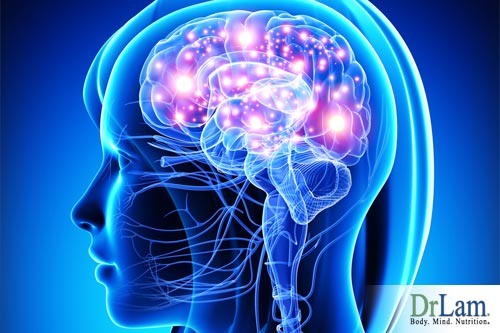The prevalence of Adrenal Fatigue Syndrome (AFS) among teenagers and young adults is on the rise. We are seeing an onslaught of this problem as young as the early teens, and some even experience significant AFS symptoms in their pre-teen years. It's become clear that AFS is a growing concern for teen health.
According to neuroscience, the brain is largely an unfinished product by the time a child reaches the age of twelve. This is a drastic departure from previous medical wisdom. For centuries, children entered initiation rites and started learning trades at about the onset of puberty. It is thought that the brain is mature enough to learn, make decisions, and take on proper responsibilities. Brain scan studies show that the brain is far from fully developed at this age. Both white and gray matter continues to undergo significant changes structurally well past puberty, into the late teens. The brain may not mature until as late as age twenty-five.
 Let's examine the anatomy. At birth, we are equipped with most of the neurons our brains will have in our lifetime. In fact, we have the most in utero, with maximum brain-cell density between the third and sixth month of gestation, where prenatal neural growth is at full throttle. During the final months before birth, our brains spontaneously undergo a dramatic auto-pruning process where extra and unnecessary brain cells are eliminated as part of the house cleaning exercise. Proper pruning is part of the normal brain routine before allowing the fetus to enter the world. Autism may be the consequence of a pruning process gone astray. The brain actually grows very little over the course of childhood relative to other organs. By the time a child is six, the brain is already closer to ninety percent or up to ninety-five percent of its adult size.
Let's examine the anatomy. At birth, we are equipped with most of the neurons our brains will have in our lifetime. In fact, we have the most in utero, with maximum brain-cell density between the third and sixth month of gestation, where prenatal neural growth is at full throttle. During the final months before birth, our brains spontaneously undergo a dramatic auto-pruning process where extra and unnecessary brain cells are eliminated as part of the house cleaning exercise. Proper pruning is part of the normal brain routine before allowing the fetus to enter the world. Autism may be the consequence of a pruning process gone astray. The brain actually grows very little over the course of childhood relative to other organs. By the time a child is six, the brain is already closer to ninety percent or up to ninety-five percent of its adult size.
Anatomically, the neurons grow bushier between ages six to twelve. Each neuron makes dozens of connections to other surrounding neurons. New pathways or highways, for nerve signals are created. This proliferation process peaks at age eleven for girls and about twelve-and-a-half for boys, when the second round of pruning begins. This wave of neuron proliferation followed by pruning starts during puberty, extending into the late teens and possibly to young adulthood. Gray matter then thins out at the velocity of about 0.7 percent a year, tapering off only in the early twenties. The final pruning process affects some of our highest mental functions. Unlike what happens prenatally, the neuronal synapses are affected primarily and are made more efficient. The neuronal highway network, as a result, has less traffic, allowing transmission speed of signals to increase as the brain matures.
 How the adolescent spends their time can affect this primary process and is guided both by genetic factors as well as by the use-it-or-lose-it principle. The more the brain is used, the stronger it is. For instance, practicing piano quickly thickens neurons in the brain regions that control the fingers. The last portion of the brain to be pruned is the prefrontal cortex. This is where logic and executive functions are located. Prioritizing, planning, organizing tasks, discipline, suppressing feelings, and the all-important decision-making functions are among the final steps of the brain maturation process. It comes as no surprise that most young teenagers succumb to peer pressure and are unable to stand their ground on decisions they make.
How the adolescent spends their time can affect this primary process and is guided both by genetic factors as well as by the use-it-or-lose-it principle. The more the brain is used, the stronger it is. For instance, practicing piano quickly thickens neurons in the brain regions that control the fingers. The last portion of the brain to be pruned is the prefrontal cortex. This is where logic and executive functions are located. Prioritizing, planning, organizing tasks, discipline, suppressing feelings, and the all-important decision-making functions are among the final steps of the brain maturation process. It comes as no surprise that most young teenagers succumb to peer pressure and are unable to stand their ground on decisions they make.
As this pruning process goes on during adolescence, the brain's white matter with its fatty myelin sheaths thickens. The thicker the myelin, the better the electrical conduction. Electrical voltage resistance is reduced, and nerve-signal transmission speed increases. This thickening can continue, much like tree rings, until well into adulthood, up to age forty.
During maturation from adolescence into young adulthood, neuron connections are therefore fewer but faster. Signal transport efficiency is increased, but due to the loss of the absolute number of neurons from pruning, its raw potential and trauma recovery potential may be limited if physically injured. This efficiency means a tendency to make fast emotional and feeling-based decisions that depend on impulse rather than logic and can have an effect on teen health. The ability to logically and systematically weigh the pros and cons typical of an adult in important decision-making processes is often overshadowed and overpowered by emotions at hand. Teenagers and young adults, therefore, tend to make many wrong choices as a result. In other words, the maturing brain has yet to be fully developed to allow a comprehensive thought process to take place.
While the brain is undergoing structural changes and maturing during the teenage years into young adulthood, the body also comes under a rampant hormonal assault starting in puberty that can affect teen health. Between the ages of six and eight, the adrenal glands on top of each kidney start to increase production of pro-hormones and upstream hormones such as pregnenolone and DHEA (dehydroepiandrosterone). These then in turn are used to make normal downstream sexual hormones such as estrogen, progesterone, and testosterone necessary for physical maturation.
At puberty, the ovaries and testes output of estrogen and testosterone respectively increases. The reproductive system matures as a result. The body shape changes in the female as menses begins, with hair growth in the armpits and groin girth increase. In the male, the voice deepens as muscle mass increases driven by testosterone and other anabolic hormones, many of which originate in the adrenal glands.
 Sex hormonal change can trigger intense emotions and unpredictable behavior. These adrenal sex hormones are highly active once they circulate in the brain. When attached to brain receptors, a direct influence on serotonin and other neurochemicals that regulate mood and excitability can result. Select neuroendocrine hormonal pathways contribute to the appetite for sexual desire. Strong but fragile emotions are activated from the brain and may be put on over-drive during this time. The thrill seeking mentality and increased sexual appetite of adolescents and young adults may well be rooted in the presence of such over-activation.
Sex hormonal change can trigger intense emotions and unpredictable behavior. These adrenal sex hormones are highly active once they circulate in the brain. When attached to brain receptors, a direct influence on serotonin and other neurochemicals that regulate mood and excitability can result. Select neuroendocrine hormonal pathways contribute to the appetite for sexual desire. Strong but fragile emotions are activated from the brain and may be put on over-drive during this time. The thrill seeking mentality and increased sexual appetite of adolescents and young adults may well be rooted in the presence of such over-activation.
Males lag behind females in brain development. Girls, therefore, are more mature overall if all other parameters are the same. Unfortunately, the onslaught of excessive estrogen load from a variety of sources such as obesity, hormone-laced food and xenoestrogens (synthetic chemicals that behave like estrogen once in the body) from the environment including common items like nail polish and shampoo etc. may un-stabilize the female hormone balance during this fragile period, leading to a state known as estrogen dominance. Excessive estrogen in the body presents as a continuum of symptoms including irritability, anxiety, insomnia, water retention, and PMS. Conditions such as endometriosis, fibrocystic breast disease, PCOS, are present in more advanced states of estrogen dominance.
For about a decade from early teens up to mid-twenties, the brain has to deal with both raging hormones and normal maturation concurrently. A cognitive disconnect commonly arises as the maturing brain finds itself caught in limbo between making few major decisions in childhood and transitioning into the need to make multiple adult responsible decisions on a daily basis that are frequently distracted by hormonal imbalance.
The pre-frontal regions of the brain are responsible for logical disciplined behavior and decision-making. Mature pre-frontal cortex will lead to a calm decision-making process that puts the brakes on risky, impulsive addictive behavior. In late adolescence and early young adulthood, the body is physically nearing maturation and awarded the adult status by society but the brain maturation is lagging behind. A dissonance occurs where the struggle between doing what appears to feel good (dictated by recent and past experiences) versus doing what is right (control by the pre-frontal cortex). This is the time most vulnerable to reckless drinking, driving, and sex.
Teenage years are therefore particularly stressful because of increasing social and academic demands at a time when the body is transitioning to adulthood, with much of the brain growth incomplete while the body’s growth-related hormones are on full steam ahead. Growth hormone, testosterone, estrogen, progesterone and thyroid hormones are just some of the hormones that undergo rapid acceleration output as the body matures. These hormones need the mature brain as a braking mechanism in order to achieve a balanced socially acceptable outcome. A stressed out maturing brain under construction may not possess enough processing power to facilitate proper daily decision-making exercises in a balanced and socially acceptable fashion.
 The combination of raging hormones and mal-adaptation of a maturing brain may prove to be too stressful for some adolescents or young adults to handle. The adrenal glands are the major hormonal control center. It secretes over fifty hormones to help the body maintain homeostasis. It is also the major stress control center of the body. It is connected to the brain by numerous hormonal axes and pathways. They include the Hypothalamic-Pituitary-Adrenal axis, the Hypothalamic-Pituitary-Gonadal axis, and the Ovarian-Adrenal Thyroid axis. The more stress present, the harder the adrenals have to work and the greater the chances of breakdown for the glands that are involved in these axes.
The combination of raging hormones and mal-adaptation of a maturing brain may prove to be too stressful for some adolescents or young adults to handle. The adrenal glands are the major hormonal control center. It secretes over fifty hormones to help the body maintain homeostasis. It is also the major stress control center of the body. It is connected to the brain by numerous hormonal axes and pathways. They include the Hypothalamic-Pituitary-Adrenal axis, the Hypothalamic-Pituitary-Gonadal axis, and the Ovarian-Adrenal Thyroid axis. The more stress present, the harder the adrenals have to work and the greater the chances of breakdown for the glands that are involved in these axes.
Dysfunction of any axis from excessive stress will invariably lead to dysregulation of other axes. Imbalances between axes can cause havoc in the body. Negative and positive hormonal feedback loops may be damaged or overstressed, leading to a body that enters a state of decompensation. The nutritional and energy reserves may not be sufficient to provide what is needed for the body to overcome stress. Constant strain and drain on this reserve results in a low energy state. As the body’s energy is depleted, vitality is lost. Let us look at a typical example of what can go wrong with this neuroendocrine decompensatory cascade and its impact on teen health.
Jenny is a sixteen-year-old teenager who is in high school. She had a normal childhood and was a vibrant child until age 9, when her low energy state started to be evident. Her fatigue only got worse since her early teens. She presents with a four-year history of worsening fatigue and reduced energy for no apparent reason. She has been seen by many conventional doctors and had numerous blood tests. Her thyroid, cortisol, ACTH, DHEA, as well as hormonal and metabolic tests are normal or borderline normal for teen health. Cancer and anemia panels are negative. Her menarche started at age twelve. Because of her menstrual pain and excessive bleeding, she was put on pain medication. For social withdrawal symptoms, she was given an antidepressant. She was also prescribed sleeping pills for insomnia, which she started but received no significant benefits.
She has seen numerous functional medicine doctors as well. Various tests including toxic metal, mineral, intracellular magnesium, food allergy, gastric fluid, saliva cortisol, and stool analysis are normal. Her thyroid studies are normal with the exception of a high rT3. She tested negative for Lyme disease and Epstein Barr Virus. She tested for MTHFR genetic variant defect and the results were unequivocal. A trial of methylated B12 and folate was marginally helpful at best. Her Vitamin D level is below normal for optimal teen health, but despite supplementation, her symptoms do not improve.  At one point, she was started on natural supplements consisting of herbs, glandular, amino acids, minerals, vitamin C, enzymes, and probiotics. All of which are slightly beneficial in boosting energy in the beginning but soon lose effectiveness and fatigue returns. In addition to the functional doctors, she sees a chiropractor for back adjustments and an acupuncturist. However, these modalities do not seem to help more than one to two days each time. Liver cleanses and colonics do not help but make her condition worse.
At one point, she was started on natural supplements consisting of herbs, glandular, amino acids, minerals, vitamin C, enzymes, and probiotics. All of which are slightly beneficial in boosting energy in the beginning but soon lose effectiveness and fatigue returns. In addition to the functional doctors, she sees a chiropractor for back adjustments and an acupuncturist. However, these modalities do not seem to help more than one to two days each time. Liver cleanses and colonics do not help but make her condition worse.
Her diet is rather good, thanks to her concerned parents. In addition to avoidance of junk food, she is off wheat, corn, dairy and eggs. There is a definite improvement with a strict healthy diet but not enough to overcome worsening fatigue.
While she was physically active in her early teens, now she is unable to exercise and is struggling just to do some lights yoga three to four times a week. She used to be a highly competitive school athlete, participating in track and field teams but it became too difficult for her. She felt drained after training and it took her days to recover.
Jenny was a high academic achiever but found over the past few years that her mental concentration is suffering. She becomes impulsive, easily irritable, and confrontational with her loved ones and friends. She still experiences pain from time to time, especially during her menses, and this causes worsening insomnia as well. Now she has to eat every two to three hours in order to avoid symptoms of hypoglycemia such as nausea, irritability, and fatigue. At one point, a doctor diagnosed her as having postural orthostatic tachycardia syndrome (POTS). She was started on a heart medication called beta blocker to slow down the heart rate. That worked for a short time, but eventually, her body did not tolerate medicine well so she had to stop. Her resting heart rate is well above normal and can go up to over 120 beats per minute when under stress. She also recently experienced frequent lightheadedness on standing from a sitting position, low body temperature, and irregular heartbeats. On the weekends she spends most of her time on the couch and essentially housebound. Social interactions have been severely restricted. Her academic performance has suffered greatly as she is unable to stay focused and have the discipline to complete assignments and homework on a timely basis. She is depressed thinking about how she will miss college unless her fatigue improves. Her family is equally distraught, not knowing what to do after years of being in the dark. They have depleted their savings, having spent thousands of dollars on the numerous physicians and battery after battery of tests without any results.
There is no specific traumatic event that triggered her initial episode of fatigue. Her parents did mention that she has undergone a lot of physical stress from participation in athletic activities during school and that Jenny kept pushing through physically for a few years even though she was not feeling well.
 This case brings up a very typical example of a high achieving teenager who is obviously in trouble as the body decompensates and weakens. The typical profile has a Type A personality, is a high academic achiever, athletic, focused, intelligent, and has much to accomplish in life but somehow is not able to live up to the higher standards due to physical exhaustion even though all medical workup is normal.
This case brings up a very typical example of a high achieving teenager who is obviously in trouble as the body decompensates and weakens. The typical profile has a Type A personality, is a high academic achiever, athletic, focused, intelligent, and has much to accomplish in life but somehow is not able to live up to the higher standards due to physical exhaustion even though all medical workup is normal.
Low constitution is commonly traced back to childhood and family history can also play a role in teen health. The mother’s pregnancy may be rocky. Post-partum fatigue is common. Low thyroid during pregnancy may have gone undetected. The mother may have a long history of Adrenal Fatigue Syndrome but it is not discovered or attended to. Many have a history of infertility issues and miscarriages, especially in the first trimester.
Stressed out mothers can give birth to stressed out offspring who appear healthy and asymptomatic for years. Stressed out babies and children can be but not always are more irritable, are emotionally unstable, have increased food sensitivities, experience more frequent infections, short attention span, ADD, ADHD, frequent infections, skin rashes of unknown origin, and a lower immune system, as compared to other children their age. Weight and height are normal. It’s not until puberty that the body’s energy and nutritional reserves fall below the critical threshold required for healthy living, at which point the body starts falling apart physically.
 Is there such thing as masturbation and fatigue? Could your masturbation and fatigue be related? Could masturbation and fatigue be what is distracting your teen? Hereditary low constitutions, delayed brain maturation, and imbalanced hormonal output may play significant roles in triggering AFS when it is combined with high stress over time. The body, already low in energy reserve, is drained each time it is stressed. Even seemingly harmless aspects of their lifestyle such as masturbation and fatigue may be huge factors. If the reserve is not fully replenished in a timely manner, the accumulated net energy drain over time eventually causes the body to run out of steam. Without timely rebuilding of nutritional reserves to support the ongoing energy demand required in high performance physical or mental activity when needed, the body’s NeuroEndoMetabolic Stress ResponseSM becomes activated as it embarks on a down-regulation strategy to conserve energy for survival. Adrenal Fatigue Syndrome is the end result of such a response. keep reading to learn about the unique relationship between masturbation and fatigue, and how masturbation and fatigue are affecting the wellbeing of your teen.
Is there such thing as masturbation and fatigue? Could your masturbation and fatigue be related? Could masturbation and fatigue be what is distracting your teen? Hereditary low constitutions, delayed brain maturation, and imbalanced hormonal output may play significant roles in triggering AFS when it is combined with high stress over time. The body, already low in energy reserve, is drained each time it is stressed. Even seemingly harmless aspects of their lifestyle such as masturbation and fatigue may be huge factors. If the reserve is not fully replenished in a timely manner, the accumulated net energy drain over time eventually causes the body to run out of steam. Without timely rebuilding of nutritional reserves to support the ongoing energy demand required in high performance physical or mental activity when needed, the body’s NeuroEndoMetabolic Stress ResponseSM becomes activated as it embarks on a down-regulation strategy to conserve energy for survival. Adrenal Fatigue Syndrome is the end result of such a response. keep reading to learn about the unique relationship between masturbation and fatigue, and how masturbation and fatigue are affecting the wellbeing of your teen.
Other major triggers of AFS for the teenager can include excessive extreme exercise, perfectionist characteristics, uncontrolled obsessive-compulsive personality traits, severe accident, loss or death of a loved one, chronic pain, family disharmony, chronic or acute infection, excessive use of antibiotics, chronic sex, and chronic insomnia. Poor diet can also be a contributing and precipitating factor but seldom the main root cause. Childhood trauma such as incest, sexual assault, frequent relocation, emotional instability, and being bullied at school can all add to the insult and contribute to Adrenal Fatigue Syndrome. But, what about masturbation and fatigue? Could something this simple be impacting your child in a major way?
One seldom-researched trigger of AFS is insomnia or chronic insufficient sleep. The teenage brain needs more sleep relative to the adult brain during the maturing phase. This sleep cycle is also different. Many teenagers feel their best late at night. They tend to sleep in late, often well into the morning, before awakening. Many have difficulty falling asleep. Lack of proper sleep has been shown to retard brain maturation and increase brain neuronal cell death in advanced cases. A brain deprived of healing sleep will not be able to carry out activities that require focus and concentration at peak performance, such as studying for a test. Academic performance is invariably affected. Many are addicted to energy drinks as a way to boost mental function. These more often than not contain caffeine-like compounds, that though natural, are stimulatory in nature. Relying on such boosters can have a devastating effect on the body over time. As the body develops a tolerance for such compounds, more is required to achieve the same level of energy. Eventually, the body becomes wired. Energy crashes inevitably occur if not addressed. With each crash, the adrenal hormonal pathways are stressed further. AFS can be the end result.
So, masturbation and fatigue are related. Excessive chronic masturbation is a common cause of AFS in males and young adults. This is seldom discussed. Masturbation and fatigue are often activities/feelings teens don't feel comfortable discussing with adults. The pervasiveness of sex in the modern world is frightening and unavoidable. There is no easy escape. We live in a world where songs with sexual orientation are available 24/7. Pornographic materials and video games with sexual orientation are easily available and free over the web. The maturing brain that is focused on emotion rather than logic is easily distracted from logical constructs necessary for successful and balanced living. It is easily distracted by sex where instant gratification can be addictive, thus making masturbation and fatigue a more common issue than one might assume.
Masturbation is a socially acceptable release of impending sexual desire looking for physical release. It is a complex psycho-neuroendocrine process that starts in the brain and involves many neurotransmitters and hormones such as epinephrine, norepinephrine, prolactin, acetylcholine, dopamine, and serotonin working in unison. An orgasm is a very intense, physiological process.
Achieving an orgasm is one of the most pleasurable of feelings. For this reason, men especially may frequently either pursue sexual encounters or masturbate in lieu of sexual activity. Excessive ejaculation over time can deplete the body of essential nutrients and vital body fluids while increasing metabolite byproducts. Sexual exhaustion can result as precious energy is diverted to replenish body fluids. Those who masturbate frequently are at higher risk.
Hormone imbalance associated with chronic masturbation includes depletion of acetylcholine, dopamine, and cortisol. Thyroid hormones can become imbalanced, and liver function burdened from the excessive metabolic workload. The result is an immune system that is compromised. Frequent orgasms can lead to sympathetic and parasympathetic nervous function imbalance, stressing the adrenals as they try to stabilize this imbalance by putting out more cortisol, the anti-stress hormone. Excessive cortisol output over time can lead to low cortisol levels and adrenal exhaustion.
The hormonal homeostatic feedback loop becomes deregulated over time, leading to the fight-or-flight alarm response activation. Epinephrine is a neurotransmitter required as part of the sympathetic nervous system stimulation during alarm response. Constant excessive epinephrine release flooding the body due to masturbation can lead to a state of sympathetic overtone, which is not healthy. The body in its best compensatory effort will try to downregulate all organ systems to conserve energy, resulting in loss of vitality, energy, and lethargy. In advanced cases, the body is physically forced into incapacitation, and energy output is minimized. Sexual desire will diminish, leading to reduced libido in both male and female. Menses may become irregular and absent for prolonged periods of time. This is the body’s way of saying enough is enough it's time to rest. The body’s reproductive system is clearly important for the survival of the human species, but our bodies were not designed to be simply reproductive machines!
Recovery for the teenager and young adult Adrenal Fatigue Syndrome sufferer requires special consideration. AFS is not a recognized medical condition. Having a primary care physician conduct a complete workup from a conventional medicine perspective is absolutely necessary to make sure there are no underlying medical issues, including infection, anemia, or even cancer. AFS should only be considered when all conventional workup is negative. Do not jump to conclusions that AFS is the cause just because symptoms match as many conditions can have symptoms that mimic AFS.
The approach of a teenager and young adult with AFS must be very different from an adult. While chronic emotional stress is the main trigger for AFS in mature adults, slow brain maturation along with raging hormones are more contributing forces for AFS in young adults and the adolescent. A different approach is therefore needed, one that focuses on long-term recovery using gentle nutritional rebuilding and management of mental expectations to allow the brain time to mature.
The following alerts need to be kept clearly in focus by the physician:
By the time the physician gets clinically involved, most Adrenal Fatigue Syndrome sufferers are well in advanced stages. The tendency is to start medication quickly to enhance energy flow if the workup is normal. Hormone replacement and medications prescribed commonly for the mature adult tend to be too much for the less mature body even though it is weight adjusted. The reason is that a young body has strong rebound capabilities and therefore less intense therapeutic maneuvers are necessary, generally speaking. Any attempt to increase energy flow for the young adult is often successful at first and rather quick. The initial success may give rise to a false sense of complacency. More medication is then prescribed, and with each step up in dosage, the response is usually positive at first.
A common recovery mistake is to continue such increases indiscriminately. The body can only tolerate so much stimulation, and over time, can reach its maximum stimulatory level. This is not an overnight process and usually, happens over a period of months or years. The problem is that this is seldom noticed. Over time, the body becomes wired with medication, but cannot do without it. A state of wired and tired ensues and is very uncomfortable. Typically, anxiety sets in during the day but insomnia is severe at night.
Some will discontinue medication immediately upon feeling better. As fatigue returns, they are quick to restart again, using medication as a clutch repeatedly while they hang on to lifestyles that are non-conducive to the healing process.
Always be on alert for this common recovery pitfall. The smartest approach is to titrate the recovery into tiny baby steps and avoid the start and stop approach. We prefer to use nutrition rather than medication to affect this because it is far gentler and can get the job done just as fast, and often faster. The benefit is less significant unintended consequences when done properly.
The single focus on speed of recovery as the ultimate measure of successful healing is therefore often misleading. Remember that the body has been injured for years usually by the time a clinician’s advice is sought. It cannot be expected to heal quickly over a short period of time without symptoms relapse if fatigue is chronic and unrelenting. The body is not a light switch that can be switched on and off repeatedly at will without significant collateral damage over time. The faster the healing process, the higher the risk of crashes further down the road because the strong foundation of healing that takes place over time has not yet been built.
 While medications can be useful in the short-term to help manage acute medical instability, this is seldom the long-term solution to the root cause. Unless underlying stressors are identified and removed, short-term symptom suppression can lead to a long time deterioration of the body’s adrenal and other endocrine systems functions. The body of an adolescent or young adult is already overflowing in a sea of hormones. Conventional medicine doctors commonly use anti-depressants and sleeping pills to help with the emotional state. Frequently prescriptions are given for hormones like DHEA, pregnenolone, and testosterone, and thyroid medications to boost energy. Such external hormones may lead the body’s internal endocrine system to down-regulate or compromise its negative feedback system, creating life long dependency issues as the body’s endocrine system becomes lazy since it is constantly supplied with external hormones. Chronic medication dependency is highly undesirable.
While medications can be useful in the short-term to help manage acute medical instability, this is seldom the long-term solution to the root cause. Unless underlying stressors are identified and removed, short-term symptom suppression can lead to a long time deterioration of the body’s adrenal and other endocrine systems functions. The body of an adolescent or young adult is already overflowing in a sea of hormones. Conventional medicine doctors commonly use anti-depressants and sleeping pills to help with the emotional state. Frequently prescriptions are given for hormones like DHEA, pregnenolone, and testosterone, and thyroid medications to boost energy. Such external hormones may lead the body’s internal endocrine system to down-regulate or compromise its negative feedback system, creating life long dependency issues as the body’s endocrine system becomes lazy since it is constantly supplied with external hormones. Chronic medication dependency is highly undesirable.
A clear exit strategy should be in place prior to starting any medication, especially hormones.
The teenage and young adult body is undergoing rapid hormonal changes that are part of the normal growth process. Any attempt to bypass or suppress such normal hormonal maturing pathways, feedback systems and axis self-regulation may cause unintended side effects in addition to addiction mentioned earlier. For example, birth control pills could temporarily reset and regularize the menstrual cycle. However, it may cloud the underlying picture of hormonal imbalance, leading to infertility issues later in adulthood. Sleep medication may provide temporary relief but can mask the underlying metabolic dysregulation. Those with sleep maintenance insomnia (waking up in the middle of the night) are particularly vulnerable. Blood sugar imbalances are frequently an important contributor. Such metabolic imbalance during sleep often triggers an adrenaline response, leading to awakening.
When the underlying cause is masked, the ability to gauge the true state of recovery is compromised. Always focus on the root cause. Failure to address this underlying cause could lead to a continued worsening condition, with blood sugar instability and ultimately diabetes.
As mentioned earlier, the rebound capacity of a teenager is far superior to that of a mature adult in their forties or fifties. Such resilience is only good for recovery if properly managed. When dealing with excess masturbation and fatigue increase, glandular and herbal formulas for teenagers can seem quite useful as they often produce a short-term increase in energy that can be rather exaggerated. This positive burst of energy can be misunderstood. Due to the incomplete understanding of the entire root cause, the common perception is that recovery is complete. This is usually followed by the desire to catch up on lost time by increasingly utilizing the new vitality for physical and social activities, by participating in parties and extreme sports, as well as a return to poor dietary habits. Over time, this can deplete the energy reserve. Adrenal crashes are triggered, worsening the condition.
For survival, the body then activates the autonomic nervous system (ANS) as the body enters a fight or flight mode mediated by norepinephrine and epinephrine. Frequent activation and deactivation of the ANS can lead to a body that becomes highly sensitive to the stress of all kinds. Over time, in extreme cases, noise, temperature, food, and vibration intolerance are common. Car rides become uncomfortable with frequent yawning. Feeling drained when exposed to direct sunlight or hot water baths are just some of the many examples encountered in day-to-day living that become problematic.
The body enters a roller coaster state energy-wise, swinging from overly tired after a crash to a state of high energy triggered by the increasing use of medication. A sense of anxiety or being wired is experienced at the height of emotions, while the lows are accompanied by feelings of lethargy, disappointment, frustration, and depression. With each crash, the body gets weaker. Like a rubber band that is repeatedly overstretched, the rebounding capability is ultimately reduced gradually and slowly. A fragile state ultimately ensues with frequent crashes, which may land the sufferer repeatedly in an emergency room for heart palpitations, anxiety attacks and a sense of impending doom. Because this happens slowly over a few years, the person is unaware of the consequences until the final major crash occurs, resulting in incapacitation.
Those who are looking for quick fixes will find that over time their use of compounds, including glandular, herbal nutrients such as rhodiola, ginseng, licorice, ashwagandha, and maca can do more harm than good. Aside from tolerance, withdraw, and addiction issues, one must remember that all such compounds must be cleared by the liver. Excessive burden placed on the liver to process and detoxify these compounds, though natural, may lead to liver sub-clinical congestion. Liver function tests remain normal while detoxification capacity is reduced. The body’s toxic load is increased. Toxins in the body can trigger brain fog, joint pain, anxiety and a host of other undesirable symptoms. Conventional doctors at a loss of what to do are tempted to prescribe anti-depressants, analgesics, and sleeping medications as a solution. Such medications, in turn, pose even more burden on the liver, as they too, have to be cleared there. If the liver overburden issues are not resolved promptly once they are congested, this may lead to a lifelong challenge of retarded or lagged recovery and increased food and chemical sensitivities as well. This additional burden further retards the recovery process and can worsen the overall condition.
Managing recovery expectations is important. This is very difficult for most teenagers because of peer pressures. The high achiever will find this particularly challenging and can be emotionally devastating.
Parental education and understanding of this condition is a key factor as well. Parents need to understand that long-term unresolved AFS in a teenager can evolve into a chronic debilitating condition well into adulthood. If left to the teenager to navigate alone, chances of recovery failure are very high. The more involved the parents are, the better the chance of success.
On the parental side, the tendency is towards finding a quick fix as well. Parents need to have the patience and consistency during the entire process while the teenager is on a recovery program. Ups and downs with setbacks are part and partial of the overall recovery process.
Recovery time is hard to predict. A one to two year time frame is not unusual. The key is to not force the body. Both the teenager and the parents must embrace this notion and put it in proper perspective. The body will dictate the recovery timetable. Pushing the body faster than it is capable of going is a common mistake and a recipe for recovery failure.
No matter how long it takes for recovery, it is still a small price to pay for a lifelong solution to this complicated condition. The alternative is to jump from doctor to doctor, engaging in medications and supplements that are symptom driven. This can ultimately worsen the condition over time and as a result subject the teenager to a lifelong struggle of incapacitated living.
 There is little doubt clinically that AFS exists in children. Hard scientific evidence is perhaps decades away due to the lack of laboratory testing and measurement data in the pediatric population.
There is little doubt clinically that AFS exists in children. Hard scientific evidence is perhaps decades away due to the lack of laboratory testing and measurement data in the pediatric population.
The common signs and symptoms are not the same as those in adults. In particular, physical lethargy and fatigue may not be present as a predominant symptom. Children are full of resilience and energy reserves. AFS is often passed over just because fatigue is not the predominant symptom or perhaps not present. This is very different from mature adults. The absence of fatigue therefore in children does not mean that some form of AFS is present.
Common symptoms are:
These symptoms, collectively viewed from afar, are consistent with a weak internal adrenal system. The absence of fatigue points to a body with sufficient nutritional and energy reserves and abundant resilience typical of children. A detailed history with an expert is critical to make the proper assessment.
The use of nutritional supplementation needs to proceed very carefully and only after ruling out possible organic causes. Blind supplementation can worsen the condition because the body is constantly changing and growing. Over-supplementation is common and can cause serious side effects. Commonly used herbs, glandulars, and vitamins suitable for adults are often not necessary for children and can, in fact, lead to dependency, resistance, and withdrawal issues.
In conclusion concerning the relationship between masturbation and fatigue, helping a teenager and young adult recover from Adrenal Fatigue Syndrome is very different from that of a mature adult. Without factoring in the needs of a maturing brain or a body that is already flooded with hormones, it is rather easy to use medications or natural compounds to increase energy for the sake of energy, forgetting the underlying root problem.
The teenager’s body is generally more receptive to recovery as compared to that of a matured adult at first. So, if masturbation and fatigue have been a concerning, healing is possible. They are also more impatient. A faster response can be dangerous. Without a systematic approach that is well thought out ahead of time, short-term success can bring long-term troubles. Until the root problem is sorted out and addressed, symptoms patching can often worsen the underlying state over time. For a teenager just starting out in life, this can be devastating.
Because the conventional or functional testing is usually normal or marginally abnormal, it is important to rely more on clinical findings and not simply treat for laboratory numbers.
A comprehensive plan for the overall recovery with realistic timing is key. While nutritional supplements can be helpful, if used, they must be monitored very carefully and titrated in order to avoid a false sense of recovery. Refraining from excessive physical activities and conservation of energy is mandatory during the recovery period, while maintaining strong muscle tone is important. A good balance between aerobic and strength capacity is critical as adolescent growth spurts should be maintained uninterrupted. Reducing masturbation and fatigue reduction couldchange your childs future.
Recovery will take time, and there is no short cut. If self-navigation fails to bring stabilization or long-term results for those with mild AFS, it is best to consult an experienced health care professional so as to avoid the many recovery mistakes most people make. If the AFS is in advanced stages, seeking professional help is critical to avoid plunging the young body into a lifelong debilitating mode of living. Don't let masturbation and fatigue be the downfall of your youths bright future.

Unfortunately, we are seeing that much more nowadays than a few decades ago. Hormone-laced food and stress can contribute to this.
It is usually is more prominent from age 30 onwards. Sadly, we see AFS cases in teenagers more often.
One can develop thyroid hormone dysfunction at any age. A lot may be related to your constitution, heredity, or stress level. Most commonly, we see the problem surfacing from teenage years to middle age.
A conventional medical workup is necessary. Clinically the picture of presentation needs to be factored in for puberty as well. A detailed history will often be the best clue.

"I wanted to thank you"
"I wanted to thank you so much for the articles. I've read your articles again and again. There are so much info and I'm picking up things that are related to me."